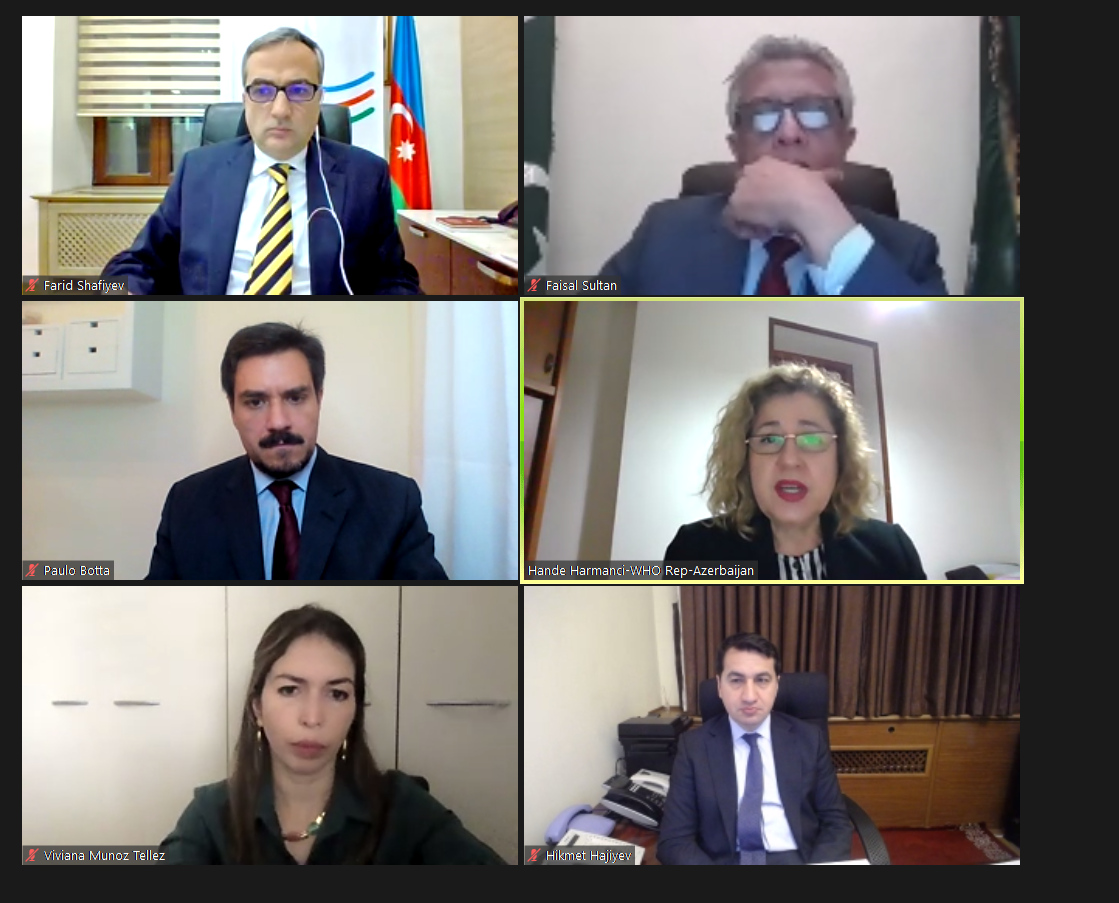An international webinar entitled “Geopolitics of COVID-19 pandemic and vaccination” was organized by the Center of Analysis of International Relations. AIR Center’s Chairman Farid Shafiyev, who moderated the webinar, stated that a number of issues related to the global COVID-19 pandemic had been politicized. Noting that the reaction and responsibility of China, the country of origin of the virus, has caused a number of discussions, Dr. Shafiyev stressed that no country is actually responsible for the outbreak of the pandemic. He also stated that a number of measures and reactions taken by the WHO to prevent the pandemic were politicized. Farid Shafiyev added that the initiative to distribute vaccines to poor countries was put forward by President Ilham Aliyev, noting that Azerbaijan, as the country chairing the Non-Aligned Movement, has not only a moral responsibility but also an official duty in this matter.
Speaking next, Hikmat Hajiyev, Foreign Policy Advisor to the President of Azerbaijan and the Head of Foreign Policy Affairs Department of the Presidential Administration, stated that the WHO has been an important partner throughout the process of adapting the national health system in Azerbaijan to the new situation. He noted that the initiatives at the national, regional and international levels should complement each other, emphasizing that the Non-Aligned Movement held an international summit in May 2020 at the initiative of Azerbaijan and a special fund was established with the support of the WHO. A special session of the UNGA was convened at the initiative of Ilham Aliyev and more than 155 states supported this initiative.
Hikmet Hajiyev said that the vaccination process has begun in a number of countries, including Azerbaijan. However, he added that there is currently a problem of “vaccine nationalism”, noting that 90% of vaccines are purchased by wealthiest countries. He stated that a global vaccination program is the only solution, and “affordable, unhindered, equitable” access of all countries to the vaccines must be ensured.
The head of the WHO Office in Azerbaijan, Hande Harmanci, said that although the whole world was suffering from the pandemic, the poorest and most disadvantaged have been hit the hardest. According to her, it is gratifying that the number of new cases on a global scale has been steadily declining in recent weeks. However, she also touched upon the problems that arose during the vaccination phase: “More than 90 percent of countries now rolling out vaccines are wealthy countries. Meanwhile, about 130 countries with an overall population of more than 2.5 billion people have not yet administered one single dose of vaccine. We must not allow these inequalities to deepen.” According to her, the COVAX initiative, in which the WHO is a partner, was created to eliminate inequality. Mrs. Harmanci said that COVAX aims to distribute 2 billion doses of the vaccine to low-income countries by the end of 2021. As for Azerbaijan, the WHO official said that the vaccination process has started successfully in the country; health workers have been vaccinated in Azerbaijan since January 18 and more than 80,000 overall have been vaccinated: “The Azerbaijani government is doing its best to make the vaccine available to the population”.
In his speech, Faisal Sultan, Special Assistant to the Prime Minister of Pakistan on National Health Services, stressed the importance of a fair distribution at the international level in the fight against the pandemic, as well as the systematic equal distribution within the countries. According to him, the problem of a limited supply of vaccines must be resolved.
Paulo Botta, president of the Centre for Contemporary Middle Eastern Studies (CEMOC) (Argentina), spoke about the economic impact of the pandemic on Latin America. He said that even if traditional social incentives and other measures are taken, it will be difficult to return to the pre-pandemic economic situation. According to him, the pandemic showed that investment in technological infrastructure should be increased.
Speaking next, Cesar Edgardo Martinez Flores, Executive Director of the Center for Foreign Relations Studies (CEERES) (El Salvador), also noted the problem of geopolitical dependence in the Latin American region. The expert said that the pandemic has once again demonstrated the importance of multilateralism and proved the importance of a global approach to global problems.
Viviana Munoz Tellez, a policy expert on intellectual property, health and biodiversity issues in Switzerland’s Southern Center, said that with the onset of the pandemic, the world was changing geopolitically. According to her, at this stage, there is a need to increase the response at the global level, and the role of the WHO as one of the important parts of this work should be strengthened.
The webinar continued with a question and answer session.




